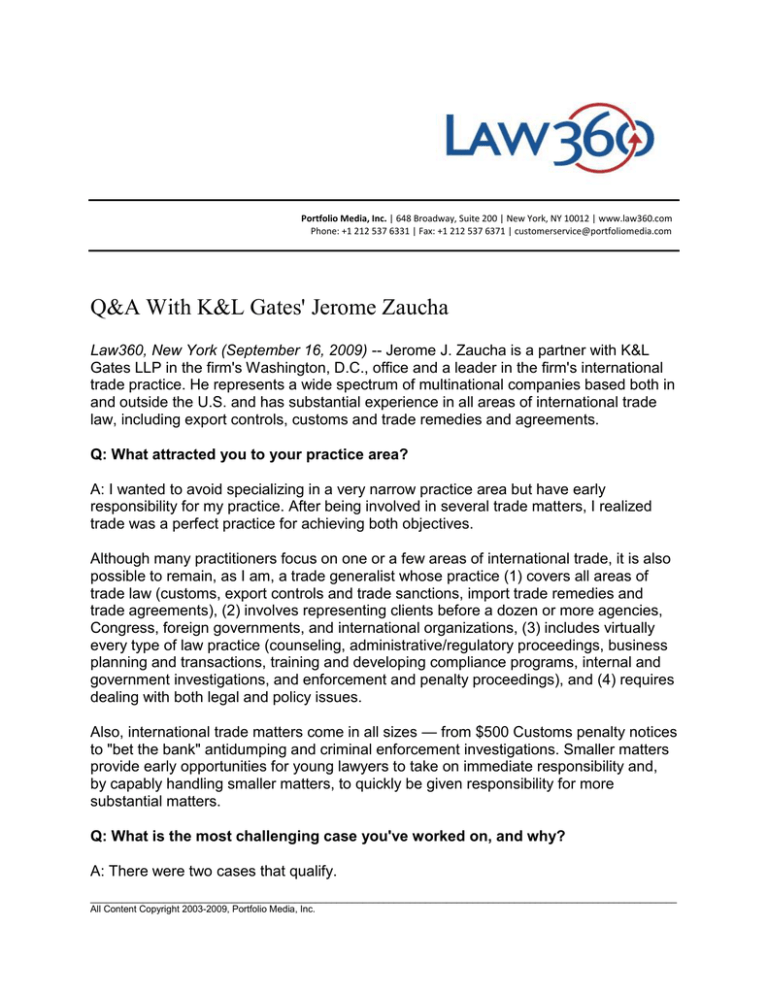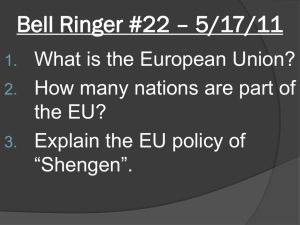Q&A With K&L Gates' Jerome Zaucha
advertisement

Portfolio Media, Inc. | 648 Broadway, Suite 200 | New York, NY 10012 | www.law360.com Phone: +1 212 537 6331 | Fax: +1 212 537 6371 | customerservice@portfoliomedia.com Q&A With K&L Gates' Jerome Zaucha Law360, New York (September 16, 2009) -- Jerome J. Zaucha is a partner with K&L Gates LLP in the firm's Washington, D.C., office and a leader in the firm's international trade practice. He represents a wide spectrum of multinational companies based both in and outside the U.S. and has substantial experience in all areas of international trade law, including export controls, customs and trade remedies and agreements. Q: What attracted you to your practice area? A: I wanted to avoid specializing in a very narrow practice area but have early responsibility for my practice. After being involved in several trade matters, I realized trade was a perfect practice for achieving both objectives. Although many practitioners focus on one or a few areas of international trade, it is also possible to remain, as I am, a trade generalist whose practice (1) covers all areas of trade law (customs, export controls and trade sanctions, import trade remedies and trade agreements), (2) involves representing clients before a dozen or more agencies, Congress, foreign governments, and international organizations, (3) includes virtually every type of law practice (counseling, administrative/regulatory proceedings, business planning and transactions, training and developing compliance programs, internal and government investigations, and enforcement and penalty proceedings), and (4) requires dealing with both legal and policy issues. Also, international trade matters come in all sizes — from $500 Customs penalty notices to "bet the bank" antidumping and criminal enforcement investigations. Smaller matters provide early opportunities for young lawyers to take on immediate responsibility and, by capably handling smaller matters, to quickly be given responsibility for more substantial matters. Q: What is the most challenging case you've worked on, and why? A: There were two cases that qualify. ________________________________________________________________________________________________________________ All Content Copyright 2003-2009, Portfolio Media, Inc. The first was a criminal investigation conducted by agents from BIS, Customs and the FBI under the direction of an assistant U.S. attorney, the first notice of which was the agents serving a search warrant and grand jury subpoena at the client's offices. The investigation focused on alleged violations of the regulations of multiple agencies, each of which also had the authority to impose civil penalties and sanctions. Handling the case required the careful coordination of white collar and regulatory backgrounds and the exercise of judgment in dealing simultaneously with the criminal and civil faces of the investigation. The other case involved a product imported from an EU country that was subject to a punitive tariff as a result of a U.S.-EU trade dispute which led to the WTO authorizing the imposition of trade retaliatory sanctions by the U.S. Over a 10-year period, the case directly or indirectly involved: a request to U.S. Customs for reconsideration of the tariff classification; several administrative protests; several appeals to the Court of International Trade; a request to Customs for a country of origin ruling; a proceeding by the EU to consider possible retaliatory tariffs on U.S. products that could have included products exported by the client to the EU; and an administrative proceeding by the USTR to consider a modification to the list of EU products subject to retaliation. Representing the client required knowledge of a number of trade practice areas and capabilities in several practice disciplines. Q: What are the most challenging legal problems currently facing clients in your practice area? A: Although certain traditional types of international trade laws, such as those dealing with customs and fair trade remedies, have been a common feature in many countries for some time, many of these laws have become more globally applied and harmonized as a result of international trade agreements. In addition, there recently has been an increase in the implementation by many countries of other types of more nationally directed trade laws, including trade sanction and trade interests/protection laws. Both types of laws present challenges for clients. The trade laws covered by international trade agreements, although purportedly harmonized, are not always uniformly applied from jurisdiction to jurisdiction. Even more problematic, the more nationally directed laws can vary significantly from jurisdiction to jurisdiction and even conflict with laws in other jurisdictions. As a result, it is becoming increasingly a challenge for clients operating globally to comply with the trade law requirements of multiple jurisdictions in a reliable and cost effective way, particularly when those requirements overlap in application to a particular trade transaction. Q: How do you see your practice area evolving in the next five years? ________________________________________________________________________________________________________________ All Content Copyright 2003-2009, Portfolio Media, Inc. A: I expect to see three things in the immediate future: 1) The U.S. and other countries will continue to maintain trade restrictions and sanctions on a substantial list of pariah countries, persons and activities, although the list will continue to change over time. A substantial part of the trade practice will continue to focus on assisting clients with compliance with those restrictions/sanctions and associated enforcement/penalty matters; 2) The trade remedy practice will become more focused on the bilateral and multilateral resolution of disputes in lieu of national remedy proceedings; and 3) Practicing in the international trade area will increasingly require covering trade laws in multiple jurisdictions. Q: Outside your own firm, name one lawyer who's impressed you and tell us why. Tim Cullen, a litigation partner at Jones Day. Presenting a client's position in an import trade case requires developing an analysis of the products being investigated, the industry defined by those products and the dynamics of competition in that industry. Some practitioners tend to develop a standard line of analysis which they use repetitively in every trade case, regardless or the product/industry involved. However, Tim's case preparation was never dictated by how he handled his last case; he always started fresh by carefully studying the product and industry involved and developing a unique, and usually compelling, analysis supporting the client's position (which more often than not was found to be persuasive). I have always considered Tim to represent the virtue and value in the trade practice of resisting the temptation to "cut and paste." Q: What advice would you give to a young lawyer interested in getting into your practice area? A: My advice would be the same for any young lawyer: 1) Focus on developing the best possible legal skills, including writing, legal analysis and the capacity to be consistently and exceedingly careful. No amount of career strategizing or marketing skills can substitute for a solid foundation of legal skills and being a good international trade lawyer requires being a good lawyer; 2) Expose yourself to a variety of practice areas and lawyers, which is the best way to ensure you develop the best possible legal skills. Also, in the case of a trade practice, having a broad base of experience in different trade areas will make you a better and more adaptable trade lawyer; and ________________________________________________________________________________________________________________ All Content Copyright 2003-2009, Portfolio Media, Inc. 3) Reevaluate your professional goals and interests every two years. A rewarding career requires more than a good decision about what job to take upon leaving law school; it now requires a series of good career decisions over a long period of time. ________________________________________________________________________________________________________________ All Content Copyright 2003-2009, Portfolio Media, Inc.





